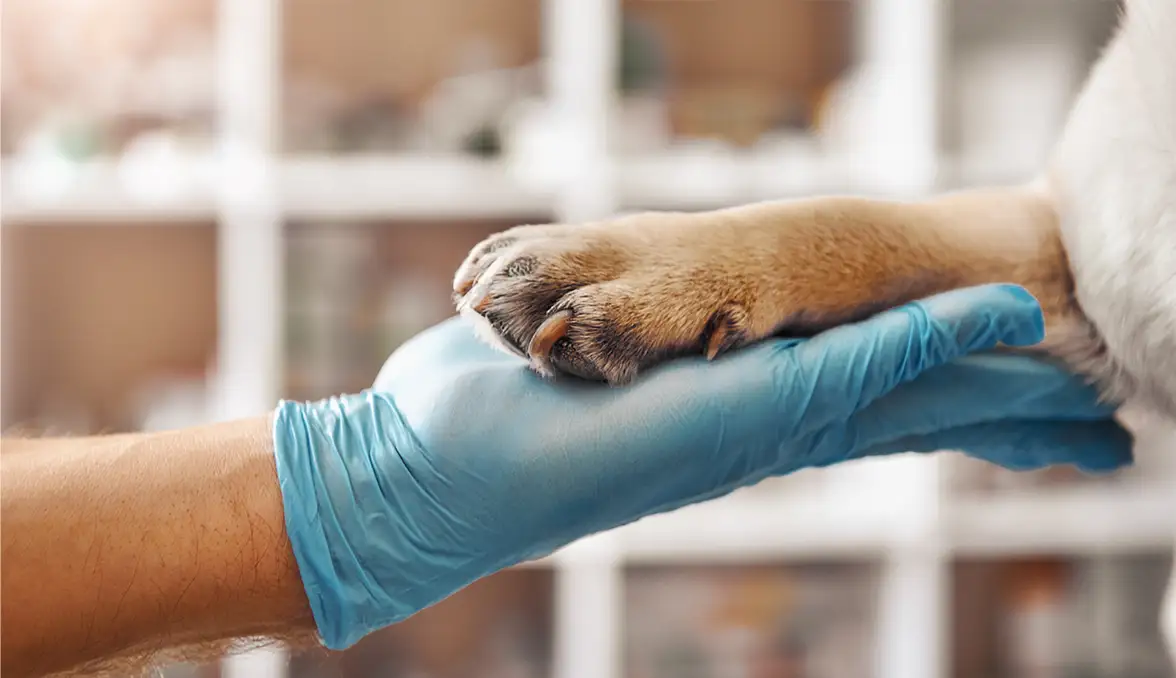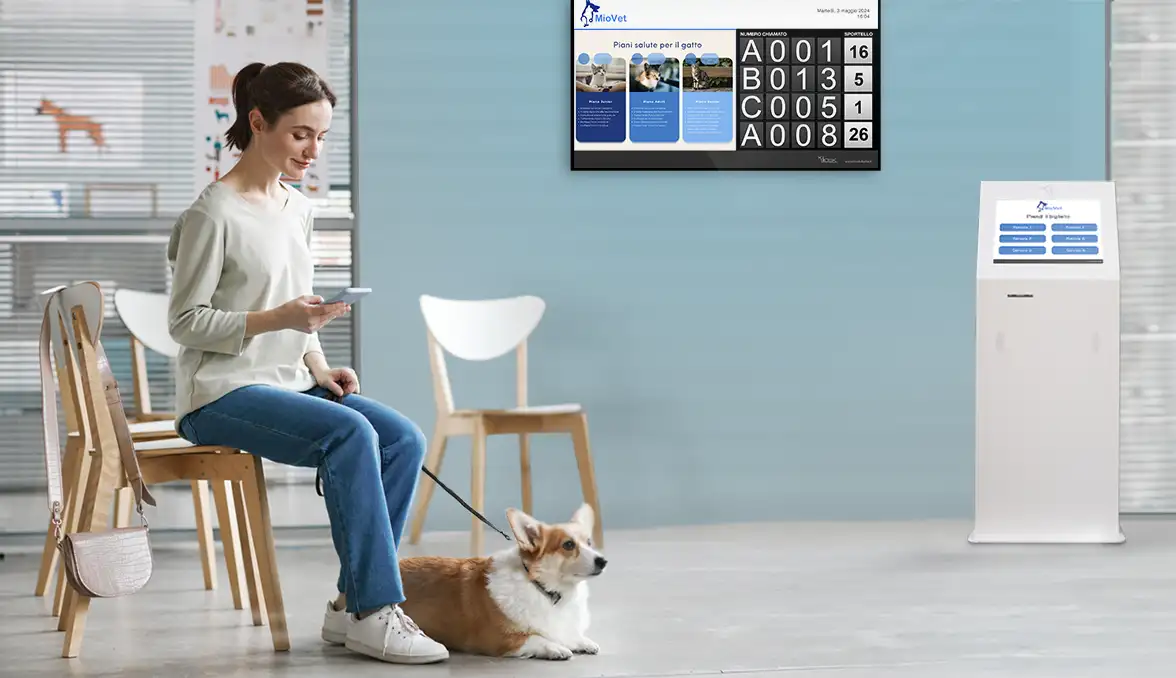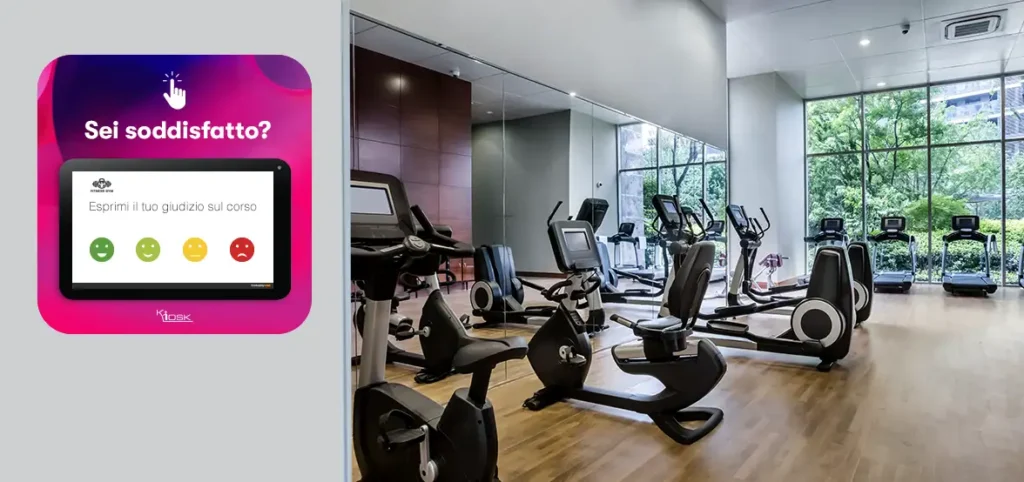Providing a quality service in a veterinary clinic means not only ensuring excellent care for animals, but also creating a positive experience for their owners.
One of the most common challenges is managing waiting times and bookings, which can cause stress and disorganization. This is why queue management systems like Kiosk Hydra represent an innovative and highly effective solution.
When pet owners face a problem with their four-legged friend, the main emotion is often anxiety. The urgency of finding an immediate solution and the need to rely on a competent clinic play a fundamental role in choosing the place to take their animal.
The feeling of being welcomed in a well-organized, professional and reassuring environment is crucial to alleviate these worries.
An efficient queue management system, together with a careful and precise welcome, can make the difference in establishing trust and serenity in customers in moments of great emotion.
Management of arrival priorities and optimization of staff
Not all visits to a veterinary clinic are the same: some can be scheduled, others require immediate intervention. Thanks to a queue management system such as Kiosk Hydra, it is possible to manage priorities in a clear and transparent way.
For example, an emergency situation can be treated immediately without compromising the flow of regular appointments.
At the same time, optimizing staff shifts is easier and more precise. The system provides real-time data on patient flows, allowing resources to be assigned where necessary.
This approach increases operational efficiency and ensures that every pet owner receives the attention they deserve.

Booking management: benefits for everyone
Integrating a digital booking system with the queue management system is a turning point for the organization of the veterinary clinic.
Clients can book their appointment online, choosing the most convenient time and reducing the time spent in the waiting room.
Upon arrival, check-in is quick and intuitive, thanks to automated registration.
For the clinic, this means having a clear view of scheduled appointments, which allows them to optimize staff shifts and manage any emergencies more efficiently.
For example, if a day has a high number of surgeries, it is possible to adapt the availability of staff based on needs, improving the quality of service and reducing stress for everyone.

Improving internal communication with digital signage
A modern queue management system does not limit itself to ordering waiting times, but uses advanced technologies such as digital signage to enrich the clinic’s internal communication.
Displays can in fact show not only the progressive numbers of customers in line, but also educational and informative content.
For example, imagine an owner waiting their turn: the display might show seasonal tips on flea or tick prevention, videos on proper pet nutrition, or information on available vaccines.
Not only does this reduce the perception of waiting time, it turns that time into an opportunity for education and engagement.
Clinics can also use digital signage to promote specific services, such as advanced diagnostic tests or senior pet wellness programs. This approach improves communication with clients and creates a more professional and welcoming environment.
Advanced statistics for data-driven decisions
One of the most significant differences between traditional management and data-driven is the availability of advanced statistics.
With Kiosk Hydra, the veterinary clinic can monitor key metrics such as average wait times, peak attendance, and the types of services most requested.
These data are not just numbers, but tools for making informed decisions, based on objective facts, not on personal feelings.
For example, if statistics show a high concentration of visits on Monday mornings, the clinic can strengthen the staff in that time slot.
Or, if a drop in attendance emerges in a certain period, targeted promotional campaigns can be planned to encourage visits.
Furthermore, as happens in other sectors, the analysis of data relating to customers and patients supports digital marketing activities, favoring the growth of the company and allowing it to build stronger and more lasting relationships.

Customer satisfaction: a crucial element
Measuring customer satisfaction is essential to continuously improve the service. Kiosk Hydra integrates an instant feedback via emoticons system, which allows pet owners to evaluate the experience quickly and intuitively.
This feedback can be linked to the booking, allowing any specific critical issues to be identified.
Often, however, collecting feedback is an underestimated or neglected aspect.
This happens because there is a tendency to focus exclusively on the service offering, assuming that customer satisfaction is implicit. In reality, actively asking for feedback is a gesture that communicates attention and respect towards the customer.
Furthermore, it provides valuable data to understand what works and what doesn’t, highlighting areas for improvement that are often invisible at first glance.
For example, if a customer reports dissatisfaction with a delay in reception, the clinic can analyze the problem and take corrective measures.
Collecting regular feedback is also a way to build a relationship of trust with customers, showing them that their opinions are listened to and valued.
Here are some common complaints that customers may have about a veterinary clinic:
- Long waits
Waiting too long for an appointment, even if it has been booked, can lead to frustration, especially in the case of agitated animals or emergency situations. - Lack of clarity in costs
If the prices of treatments or procedures are not clearly explained in advance, customers may feel confused or dissatisfied. - Unempathetic communication
Customers expect attention and understanding, especially in delicate situations. A lack of empathy from staff can create a bad impression. - Emergency management
If a clinic fails to handle an emergency in a timely manner, clients may perceive a lack of organization or professionalism. - Poor post-visit support
Lack of follow-up or difficulty in contacting the clinic for clarifications or updates can leave clients dissatisfied. - Environmental conditions
Crowded, noisy or unclean waiting rooms can create a negative impression on clients, even if the medical service is excellent. - Booking errors
Overlaps or incorrectly recorded appointments can create discomfort and a sense of disorganization. - Perceived excessive economic aspect
Even if the costs may be justified, a perception of prices that are too high compared to the value received can generate dissatisfaction. - Lack of updates on procedures
During an operation or a prolonged treatment, clients want to be constantly informed about the conditions of their animal. Insufficient communication can create anxiety and dissatisfaction. - Sense of lack of attention to animals
Clients expect staff to treat their animal with care and respect. If they perceive a cold or inattentive attitude, they may lose trust in the clinic.
Can we really still consider it superfluous to ask the client how his experience at the clinic was?
We don’t think so, especially today, in an era in which a complaint can spread quickly and negatively affect the reputation of the facility.
Conclusions
Adopting a new generation queue management system means bringing innovation, efficiency and greater attention to customer needs.
From queue management to workflow organization to satisfaction measurement, every aspect is designed to improve the experience in your veterinary clinic.
 | Find out how to improve queue management in your Veterinary Clinic?Don’t let queues and disorganization penalize your work. |
 |
Find out how to improve wait management in yours Veterinary Clinic?Don’t let queues and disorganization penalize your work.
|



